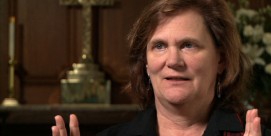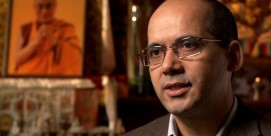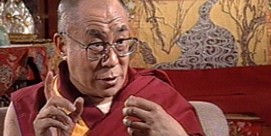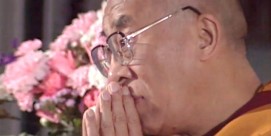PROFESSOR PAUL ROOT WOLPE: (Professor of Bioethics and Director, Center for Ethics at Emory University): In the history of ethics there have been many western views of ethics, there have been many different philosophies of ethics that have been promoted, and they’re based on you calculate an ethical position on any particular ethical problem. One of those strains is called virtue ethics. And what virtue ethics says is it isn’t through a calculation in particular, it is through your character, so how would a virtuous person handle this particular situation? The Dalai Lama’s compassion-based ethic fits into the virtue ethics tradition. It says if you meditate on compassion and you make yourself a compassionate person, when the ethical issues arise, you will have the correct personal approach to it because you will come from a place of compassion. It doesn’t give you a calculus, as for example some consequentialist or a utilitarian view, which says it’s the consequences of your action that matter. It does give you a calculus for what to do; it gives you an approach to a particular situation that will allow you to make correct decisions.
He’s really one of the few people to take a virtue ethics approach that says at the center of all virtues is compassion. Virtue ethics approaches in the past, which came out of Greece, had different…different people advocated different things to be at the center of virtue. It might be integrity for example. To say that compassion must be the central emotional approach that we take to every ethical issue is a contribution if we can show that that approach actually leads to more ethical behavior.
In his book, “Beyond Religion,” in which he lays out his secular ethic perspective, he says first, there are two components, two major components. The first is compassion and the second half of his book he actually gives a whole training program in how you develop compassion. But the second thing is what he calls discernment, which is using the rational mind and using our judgment to parse out an ethical issue, compassion isn’t enough. When we really look at ethical situations closely, it is always the ethical issues that engage us are the ones where it isn’t clear what the right answer is, where we have different ethical needs competing with each other, where both answers express compassion in some way. We have a person who wants to die but they’re still relatively healthy. Is the compassionate thing to help them die? Or is the compassionate thing to try to keep them alive for as long as possible even if right now they think they wanna die. So it isn’t compassion or not compassion, it’s which one is the right compassion. And for that we need our discerning mind. What the Dalai Lama does not do is give us any help in the discerning part. That’s what Western philosophy has been particularly interested in and focused on, almost exclusively. And so perhaps there’s an opportunity here to put together the compassionate character that the Dalai Lama wants to foster with the history of Western rational traditions, which give us different approaches to that discernment half of his secular ethic.
We’re an academic center and our job is to explore academically all different approaches to ethics, which does not mean that we don’t train students in ethics and we don’t challenge them in ethics, but I don’t think it’s up to us to choose one approach to ethics and say to the students this is the one you must follow. On the other hand, I can’t think of any down side to promoting training students in compassion. After all, the truth is it doesn’t matter which ethical system you use, it can always be enhanced by a compassionate approach.
We know that people are going to be making ethical decisions out there, our politicians and other leaders, who aren’t going to spend their time doing compassionate meditation, so if we can give them a kind of script, or a menu, or a formula, to think through ethical issues and come to a correct ethical decision, let’s do that and the compassion is great and you know we’ll encourage people to do it, but we know that we aren’t gonna have a universal compassionate meditation program, we know that world leaders aren’t gonna sit in a quiet room, or at least it’s gonna be a while before we can convince them to do that. So you have to develop both sides of that equation, you have to develop the character side and you have to develop the rational thought side. And in the West we’ve been particularly interested in the latter, I think what we see right now is much more interest in saying character matters as well.
The Tibetan Buddhist approach to compassion is a particular kind of approach that involves meditation, that involves trying to look inward to one’s compassionate heart and to foster that. That isn’t to say that there aren’t other ways to foster compassion in people or to include compassion as part of a way to think about our behavior, that don’t necessarily involve the Buddhist approach or the Buddhist practice to foster compassion.
The reason that he’s doing what he’s doing right now is…his argument is compassion and it’s various terms, love being a prominent one, are fundamental to every major world religion. Religions can divide us through their particularities, he suggests, but if we can all focus on the commonalities, perhaps we can have a more peaceful world, and the commonality he sees in all religions is this idea of compassion, love, regard for others. So he wants to use that, that’s what he actually means by the term secular ethic. He doesn’t…by secular, he doesn’t mean outside of religion, he means a unifying theme throughout all religions and nonreligious ways of thinking about the world. And he believes that compassion lies at the basis of all good human perspectives on what it means to be a fellow human being. And that is why his secular ethic…well, that’s why he’s promoting it everywhere. One other interesting thing about the Dalai Lama, and about your idea of the Christian promoter. I think that the secret to the Dalai Lama’s success is that he doesn’t proselytize, and in fact, he has said over and over again that if you come to him and you say I’m Jewish or I’m Catholic and I want to become Buddhist, he will say to you no, take this insight that you get from me and bring it back to your tradition, that’s where your work should be done. He doesn’t proselytize, and his message is purely compassion, he doesn’t put a Buddhist overlay on… he doesn’t put a dogmatic Buddhist overlay on it. And I think that’s why he’s been so successful, because most other religious leaders come with a kind of exclusive baggage, even if they don’t say it explicitly, there’s a sense that they’re really trying to promote their way of seeing the world religiously, and it’s so clear that he’s not doing that. And I think that’s part of the reason why he’s been so successful.
He’s a lovely guy. He’s gentle and got a great sense of humor, he loves jokes and he loves to laugh. He likes connecting with people on a one on one basis. His message is very sincere. He embodies his message. You meet him and you recognize that here is a person with enormous compassion. He is extremely opened-minded. He has started programs to teach his monks modern science, the Emory Tibet Science Initiative is an initiative that he created by sending one of his people here to start that program
He has said if science disproves anything Buddhism believes, Buddhism has to drop that belief. That’s an extraordinary thing to say. I wonder if a pope has ever said that or if any other religious leaders… he’s very pragmatic in that way. The other thing he said that I always love is he says Buddhism is against attachments, which means I can’t be too attached to Buddhism either. I mean you just don’t hear that kind of language from most religious leaders, and he believes those things, they’re not just rhetoric. And I think that it is that openness and open-mindedness that is so attractive to young people. He’s sincere, he’s open-minded and he preaches compassion. That’s a pretty good trifecta right there.
It isn’t enough to sit around and calculate ethical solutions, that if they don’t come from a sincere place of caring and love for your fellow person, then why are you in this business in the first place? I mean we can create a computer program that calculates some ethical flow chart that you go through to make your ethical decisions and that could be it. There’s more to it than that. Most of the people who got into ethics got into ethics for reasons that have to do with their hearts and sometimes you need a reminder of that, and I think the Dalai Lama around here, for me personally and I think for a lot of people around this campus, reminded us why we were in this in the first place.
When you challenge him with particular scenarios, as I did when I interviewed him in his visit, he doesn’t have a way of thinking about, in a deep way, the conflicts inherent in, for example, medical ethics scenarios. You know I’m a medical ethicist by training, and when we have a baby born with severe physical problems, and we have to make some decisions around that, and those decisions are extremely complex and they’re often wrapped up, not only in the baby’s welfare, but in the family’s welfare, and in the parents, even economic situation, and you’re trying to figure out what is exactly the right thing to do, he doesn’t have a way to do that. And what he calls upon is this idea of discernment, which includes common sense, but it kind of ends there. And that’s why I say that’s where Western philosophy can take over and begin to flesh out the actual complex ethical decision making part of that. Which is fine, nobody has to do all the work, and in fact sometimes it makes a lot more sense to bring two traditions together and let them complement each other.
I think trying to make oneself a more compassionate person is something we have always thought of in ethics as kind of outside what we do. We hope people do that, we encourage it, but it’s not… that’s not our job, it’s someone else’s job, and maybe now it becomes more our job. But outside of the academic ethics perspective here, I think we’ve lost practice in this country. Most major religions have practices that they engage in. I’m Jewish and I’m a Professor of Jewish Bioethics and, you know, Jewish practice is very structured and it is structured in order to try to foster certain attitudes towards the world of caring for others and of a relationship to a higher being. We’re seeing people replacing old practices in some cases with new practices, people who meditate or do yoga or other Eastern practices, and the Dalai Lama’s message about that is you’ve got your own practices, find the beauty in them and reinvigorate them, and I think that that’s a wonderful message and I think that we always look somewhere else for the exotic and the different and sometimes the answer has been right at home all along.
In the interdependence of everybody, we’re learning that not only religiously, but what has environmentalism and sustainability become a such a key idea in our culture, even among businesses that just a couple decades ago scoffed at those ideas. Because people are realizing that there’s a deep interdependence on this planet and the same thing’s true with public health and when disease is just a plane ride away, we’re all very interdependent. And within that interdependence is this idea that goes back, in every tradition and in every great line of thought, that we are all one humanity and that the things that divide us are far, far less important than the things that unite us. And coming out of that, those two insights in a deep way rather a superficial way, is I think also part of the power of the Dalai Lama’s vision.






